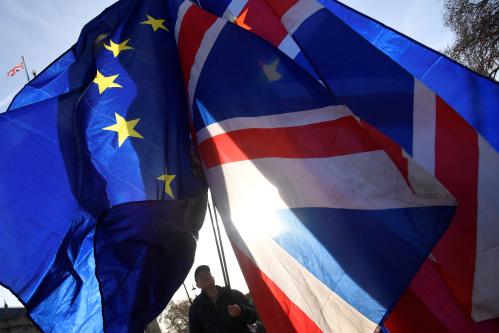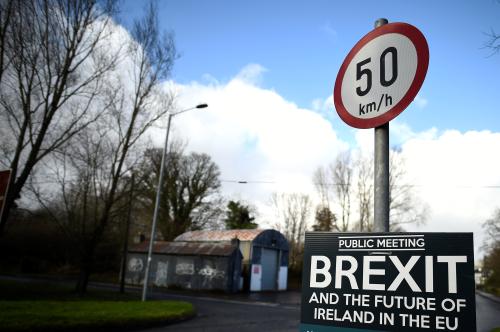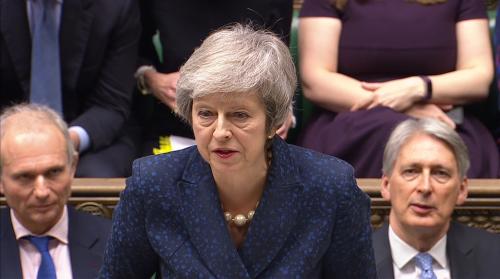The author was economic adviser to the French Prime Minister Michel Rocard in 1998 when Rocard negotiated an agreement restoring civil peace in New Caledonia in the Southwest Pacific.
One of Boris Johnson’s early moves as Prime Minister was to throw back the so-called “backstop” provision which proved the most contentious part of the Brexit deal negotiated between Theresa May and the EU. The backstop would temporarily keep the United Kingdom in the European Union Customs Union until a permanent solution is found that would avoid a hard border between the Republic of Ireland and the Northern province.
Brussels rejected Johnson’s gambit to remove the backstop, making a no-deal Brexit on October 31 a virtual certainty. Given the EU’s interest in preserving the single market and the U.K.’s obligations as a member of the World Trade Organization, prospects of a hard border within Ireland appear in that case inevitable. Thus dividing the island would threaten the provisions of the Good Friday Agreement agreed in 1998 and raise the specter of civil violence. This could be avoided by holding a referendum whereby Northern Irish citizens would vote on whether or not they want to secede from the U.K. and become part of a United Ireland, whether they want to remain part of the EU or secede from it.
The backstop arose when the U.K. rejected an EU proposal to institute customs checks in the Irish Sea. Preserving the continuity between Great Britain and Northern Ireland was a nonnegotiable demand on the part of the Democratic Unionist Party (DUP). This mattered because the support of the DUP was crucial to former Prime Minister Theresa May. May’s government referred in its first Brexit white paper to the Belfast Agreement and reiterated the U.K.’s adherence to the constitutional framework laid out in 1998. The backstop is the product of what May repeatedly called her “red lines.” Their result has been that extending the trade border to the whole of the U.K. was the only viable option and the EU reluctantly agreed to the backstop.
While rejection of the backstop is politically understandable, unraveling the Good Friday Agreement is not acceptable. The Agreement brings about the possibility that the Northern province expresses the wish to join the Republic of Ireland and serves as a “binding obligation on both governments to introduce and support in their respective Parliaments legislation to give effect to that wish.” The only way to know what those wishes are today would be to ask the question to the citizens of Northern Ireland. A recent, and in some respects similar case, shows that this makes political sense.
France’s experience with a conflict involving New Caledonia in 1998 offers a lesson in this regard. At that time, the then Prime Minister Michel Rocard negotiated an agreement between French “Unionists” and Kanack “Independentists.” This agreement, which ushered in a long period of civil peace, included a prospective referendum on the future of the territory. That referendum took place without incident in November 2018. Participation was high (81 percent) and a majority voted to remain part of France (56.7 percent). The parallels are clear.
Holding a referendum in Northern Ireland after 20 years of peaceful coexistence between the two communities is less outlandish an idea than many might think. Indeed, the electoral conditions will never be more propitious than today, since the two main groups in Northern Ireland have similar weights (40.8 percent Roman Catholic and 41.6 percent non-Catholic Christians according to the 2011 census). Rather than being based simply on religious and historical divisions, the rationale for the referendum would have several determinants linked to the consequences of belonging or not to the EU.
A recent survey indicates “55 percent of respondents [in Northern Ireland] would certainly or probably support a United Ireland in the event that the UK left without a deal, this proportion falling to 48 percent if the U.K. was to leave on the terms of the Withdrawal Agreement and to just 29 percent if the U.K. remains in the EU.” Whatever the results of a real vote, this at least suggests that the historical divisions may matter less to Northern Irish voters than the threat from a hard Brexit.
The Belfast Agreement is crystal clear about the organization of a referendum in Northern Ireland. The Agreement states: “The secretary of state shall exercise the power [of holding a vote] if, at any time, it appears likely that a majority of those voting would express a wish that Northern Ireland should cease to be part of the U.K. and form part of a United Ireland.”
Nobody can ever foretell a referendum outcome, but the fact that the people of Northern Ireland voted “remain” in 2016 (by a 2-1 majority) is a sufficient hint that the wish of the people today may merit a vote.
The conditions of such a referendum will be extremely sensitive, but the British experience regarding referenda and devolution is rich and offers a strong basis for its preparation. As noted above, the question could be adapted from the wording of the 1998 Agreement. It could ask: “Should Northern Ireland cease to be part of the United Kingdom and be part of a United Ireland?” Second, the institutional future of a United Ireland could be negotiated through an extension of the 1998 Agreement and the situation of the Northern province could possibly be inspired by the devolution acts presently ruling Scotland and Wales.
Reaching the Good Friday Agreement was difficult. Among other factors, U.S. President Bill Clinton and Senator George Mitchell played a prominent role to forge the compromise. Nothing approaching that sort of leadership exists today and getting buy-in for a referendum would require active international and political involvement.
The prospect of enforcing an Irish land border would disorganize the Northern Irish economy; it would also impose severe political costs on the EU. For these reasons, a Northern Irish referendum should be proposed, discussed, and organized as soon as possible. This could be the last chance to get rid of the backstop, as Prime Minister Johnson so ardently desires, while giving London a sense of an orderly Brexit.









Commentary
Brexit, the Irish backstop, and the Good Friday Agreement
August 15, 2019